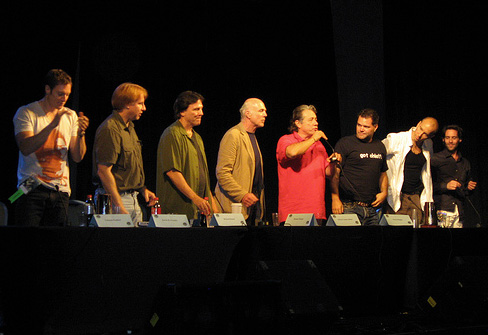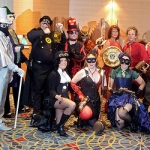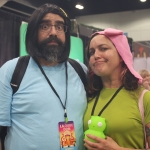We’ve all been there — you’re sitting in a panel for your favorite author/celebrity/progeek/what-have-you, and you’ve just listened to the longest question in creation asking if the panelist remembers “the one time you ate a bologna sandwich on set and in the commentary mentioned that you really wished you had onions — what was your motivation? Because my friend and I totally had a bet that you were seriously thinking about not onions but rather cheese and this is a long-standing debate which started back in the third grade when I remember watching the episode, and thinking, geez, are there crumbs from a bologna sandwich on his shirt….” Now you’re sitting in the audience screaming in your own head, “SHUT UP, SHUT UP, SHUT UP!!!” The question was somewhere at the beginning of the long tale and you don’t remember what it was, the celebrity doesn’t even look like they are paying attention anymore and this guy wants to end a long-running debate he had with someone about something. If you understand that frustration, this post isn’t for you. If you’re the person who asks five minute long questions at panels about minutia, keep reading so I don’t have to smack you next time I’m at a panel.
First off, let me share my limited credentials. I have bachelors degrees in both Psychology and Criminal Justice. In both of these degrees I have had some experience in conducting effective interviews and learned some lessons on what kind of questions you should and shouldn’t ask. I’m going to impart some of what I’ve learned to hopefully help you to form questions at a panel and do it in an effective, concise and, most importantly, a not completely annoying way. Also, please — before you even ask a question, remember to raise your hand, wait your turn, and don’t shout out. That is just so rude on so many levels. That said, here are the “Kelly Cipera Guidelines to Effective Convention Panel Questioning”: 1) Be Concise, 2) Be Focused, 3) Be Relevant, 4) Be Open-ended. Let me break these down for you:
1. Be Concise
“Concise” means giving a lot of information clearly and in a few words: brief but comprehensive. Short and sweet, baby. Before raising your hand, think about the shortest way to ask what you’re asking. Try asking your question in a sentence (that isn’t a run-on sentence). If you can’t, don’t raise your hand yet. Panels are only so long, so be polite to others and not ask a question that takes up a quarter of it. Write down your question before you ask and see how long it really is and then see if you can shave it down. Now, I understand some questions require some additional information, so if one sentence isn’t possible, keep it AT MOST three or under. The panelist doesn’t need to know you have a long standing bet, the panelist doesn’t need your back story or life history. Which brings us to:
2. Be Focused
Keep your questions focused on the question. Like I said before, don’t wander off into how the question came up. No one needs to know that one day you were sitting on the toilet when suddenly you wanted to know about River Tam’s eye color. No one needs to know that you and your gaggle of friends have been arguing over the topic for the better part of the decade or that you have been feeding the trolls on a forum on the topic. Keep yourself focused on the question at hand. This will actually help keep the question concise. Rambling will not only lose the interest of the panelist but also you are less likely to have your actual question answered because it’s been lost in all of the background information you’re providing that is completely unnecessary.
3. Be Relevant
If the panel is about Firefly, don’t ask Nathan Fillion about his time on Desperate Housewives. Keep the topic of the panel in mind. Yes, you want to know more about the panelist or you wouldn’t be there, but one actor can be in several different genres or involved in projects completely unrelated to the topic of the panel, and it is considered bad form to stray from the topic of the panel unless the celebrity brings it up. If Nathan Fillion brings up his work on Desperate Housewives, feel free to ask a follow up question, but if the panel has remained on topic don’t. We all understand this is one of a few occasions where you will be able to actually talk to the celebrity in an open forum, but at the same time if it is a panel with more than one celebrity you are not only going off topic for the audience but for the panelists as well.
4. Be Open-ended
Not long winded. There is a HUGE difference. Ask open-ended questions. These are questions that invite discussion and longer answers. We’re at a panel — we want to hear the panelists talk, not you. Asking questions that can be answered with a “Yes” or a “No” doesn’t really invite conversation or follow up questions. Many times they can even be conversation enders, especially if you’ve just talked for ten minutes about why you are asking a question and then the question only requires a yes or no. “What do you think about…”, “How did that make you feel?”, “Can you explain…” are good ways to start these questions. Chances are if you’re asking, another fan might also want to know.
So I hope that even if you aren’t “that guy” you learned something here on how to better phrase questions in a panel setting. These are helpful skills even if you’re talking to someone on the street. Remember, you’re not the only one in the room and everyone else there spent good money to be there as well. Be concise, focused, relevant, and open-ended in your questions and you will be a shining example on how to ask questions in a panel and we will all get to hear our favorite celebrities more than we hear you.
Note: Though this post doesn’t cover being a panelist yourself, there’s actually a really good rant on the subject by author Michelle Sagara on her LiveJournal. (OMG LiveJournal? That takes me way back, man.)







